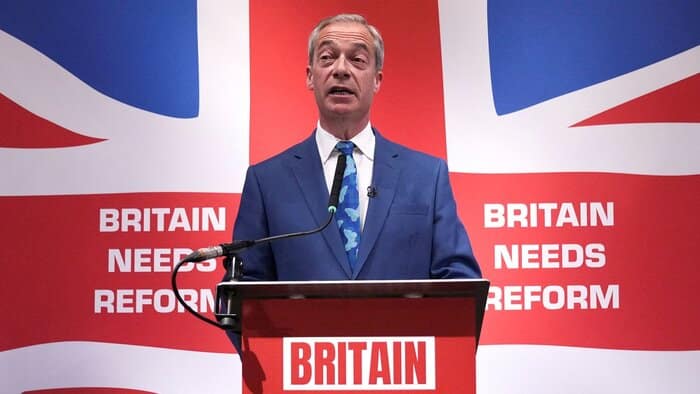Decline in popularity of traditional parties in England; is Farage close to becoming Prime Minister?
Farage, who rose to prominence a decade ago with inflammatory anti-immigrant rhetoric and claims about the benefits of Britain leaving the European Union, is back in the headlines in the country. He won his first seat in the House of Commons in last year’s election, and polls now show that his hardline stance, particularly on immigration, has won a significant chunk of public opinion.
Farage describes the Labour and Conservative parties, which have shared power in Britain for decades, as “traditional and outdated” and claims that the future of British politics belongs to emerging movements like his newly founded party.
If a general election were held tomorrow, the Reform Party would win 311 of the 650 seats in the House of Commons, according to a YouGov poll of more than 13,000 people. This is only 15 seats short of an absolute majority, but it would effectively allow Farage to become prime minister as leader of the largest party in parliament. The jump of 306 seats compared to the current position of the Reform Party is described as unprecedented in modern British history.
According to this estimate, the Labour Party, which was established in power last year with a historic victory of 411 seats, will now win a significant drop of only 144 seats. This result is not only lower than the party’s poor performance under Jeremy Corbyn in 2019, but is also considered the worst result for Labour since 1931. Among the big losers in this hypothetical election are the names of figures such as Yvette Cooper, Ed Miliband, Lisa Nandy and Wes Streeting, who are responsible for the foreign, energy, culture, and health ministries, respectively.
The Conservative Party, which was in power for 14 consecutive years before last year’s election, will be in a much worse situation. The party, which won just 121 seats in the last election, is now forecast to fall to 45 seats, its worst showing in more than three centuries. Many of the most prominent figures from previous governments, including Priti Patel, James Cleverley, Robert Jenrick, and Mel Stride, are likely to lose their seats. Such a defeat would drop the Conservatives to fourth place behind the Liberal Democrats and even the Scottish National Party, and seriously undermine the traditional two-party order in Britain.
YouGov’s forecast suggests that more than three-quarters of the Reform Party’s seats will be taken directly from Labour. This shift is particularly noticeable in the North East and East Midlands, which have become Reform’s main strongholds. By contrast, London and Scotland remain the party’s weakest spots; Farage is predicted to win only 6 seats in the capital and 5 in Scotland.

